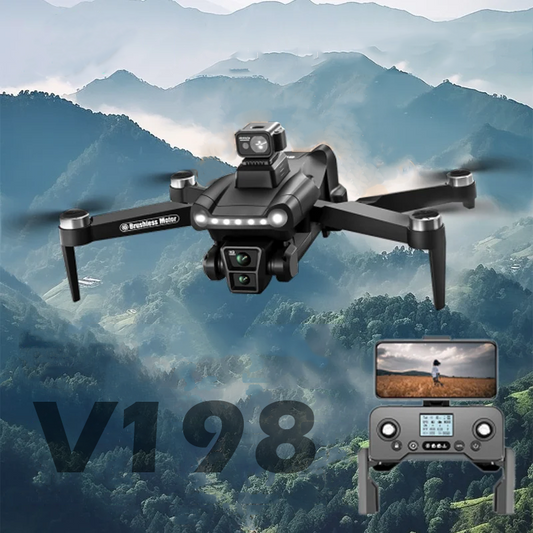Drones in Oil and Gas Industry: Applications and Benefits

In the dynamic landscape of the oil and gas industry, technological advancements continue to play a pivotal role in enhancing efficiency, safety, and overall productivity. One such innovation that has gained significant traction is the integration of drones into various operational processes. Drones, also known as Unmanned Aerial Vehicles (UAVs), are proving to be a game-changer for oil and gas companies, offering a wide array of applications and benefits that are reshaping the industry's approach to exploration, production, and maintenance.
Applications of Drones in the Oil and Gas Industry:
1. Aerial Surveys and Inspections:

Drones have become indispensable tools for conducting aerial surveys and inspections in the oil and gas sector. Equipped with high-resolution cameras and sensors, these unmanned vehicles can efficiently monitor vast and often challenging terrains, providing real-time data on infrastructure integrity, equipment conditions, and potential hazards. This capability not only enhances the accuracy of inspections but also reduces the need for manual labor in hazardous environments.
2. Pipeline Monitoring and Maintenance:

Ensuring the integrity of pipelines is a critical aspect of the oil and gas industry. Drones equipped with thermal imaging cameras and gas sensors can quickly detect leaks and assess the overall health of pipelines. This proactive approach not only minimizes the risk of environmental damage but also prevents costly downtime by addressing issues before they escalate. Additionally, drones can be used for routine maintenance tasks, such as cleaning and painting, without the need for human intervention in challenging or remote locations.
3. Exploration and Geophysical Surveying:

In the exploration phase, drones are proving to be invaluable tools for geophysical surveying. They can collect data on topography, vegetation, and geological formations, providing a comprehensive understanding of potential drilling sites. This not only accelerates the decision-making process but also reduces the environmental impact of exploration activities. Drones equipped with advanced sensors and mapping technology contribute to more accurate and efficient resource assessments.
4. Environmental Monitoring:

Oil and gas operations often take place in ecologically sensitive areas. Drones equipped with environmental monitoring tools can assess the impact of operations on local ecosystems, air quality, and water bodies. Real-time data collection enables companies to implement timely mitigation measures, ensuring compliance with environmental regulations and minimizing the industry's ecological footprint.
5. Security and Emergency Response:

Drones play a crucial role in enhancing security and emergency response capabilities in the oil and gas sector. Equipped with high-definition cameras and infrared sensors, drones can monitor facilities for unauthorized access and potential security threats. In emergency situations such as spills or accidents, drones can quickly assess the extent of the damage, providing essential information for an effective and swift response.
Benefits of Integrating Drones into Oil and Gas Operations:

1. Cost Efficiency: One of the primary advantages of utilizing drones in the oil and gas industry is cost efficiency. Drones can perform tasks that would traditionally require significant manpower and resources, reducing operational expenses. The ability to conduct regular inspections, monitor infrastructure, and assess remote locations without the need for extensive ground crews results in substantial cost savings for companies.
2. Enhanced Safety: Safety is paramount in the oil and gas industry, where operations often take place in challenging and hazardous environments. By deploying drones for inspections, monitoring, and emergency response, companies can significantly reduce the risks associated with human intervention in such environments. This not only protects the well-being of personnel but also mitigates the potential for accidents and injuries.
3. Time Savings: Drones accelerate the pace of various operational processes, from inspections to emergency response. Their agility and ability to cover large areas quickly enable companies to gather crucial data in a fraction of the time it would take using traditional methods. This time efficiency translates to faster decision-making and increased overall productivity.
4. Data Accuracy and Analysis: Equipped with advanced sensors and imaging technology, drones provide highly accurate and detailed data. This data can be leveraged for comprehensive analysis, aiding in better decision-making and strategic planning. The integration of artificial intelligence and machine learning algorithms further enhances the capability to derive valuable insights from the collected data, optimizing operational processes and resource allocation.
5. Environmental Stewardship: The oil and gas industry faces increasing scrutiny regarding its environmental impact. Drones contribute to environmental stewardship by enabling companies to monitor and mitigate their operations' effects on the surrounding ecosystems. Proactive environmental monitoring not only ensures compliance with regulations but also aligns with the industry's commitment to sustainability and responsible resource management.
As the oil and gas industry continues to evolve, the integration of drones emerges as a transformative force, reshaping traditional approaches to exploration, production, and maintenance. The applications of drones in aerial surveys, inspections, pipeline monitoring, exploration, environmental monitoring, security, and emergency response offer a multitude of benefits, ranging from cost efficiency and enhanced safety to time savings and environmental stewardship.
Companies that embrace drone technology gain a competitive edge by optimizing their operational processes, reducing costs, and improving overall efficiency. As technology advances and regulatory frameworks evolve, the adoption of drones in the oil and gas industry is likely to become more widespread, ushering in a new era of innovation and sustainability for this vital sector. Embracing the full potential of drone technology is not just a choice but a strategic imperative for oil and gas companies looking to thrive in a rapidly changing landscape.
Explore a variety of drones at our online drone store.
Happy Flying!









